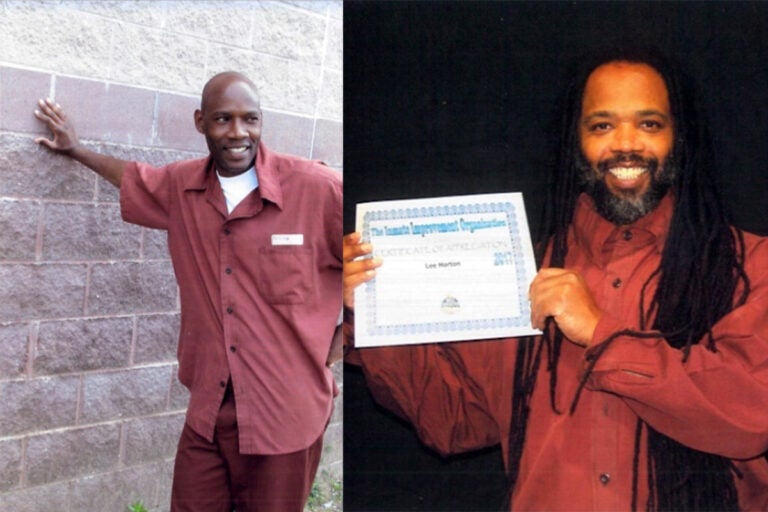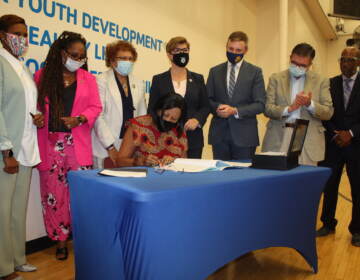These men modeled responsible manhood for me in prison. It’s time to bring them home.
I worked hard to destroy the mindset and behavior that led me to prison. Two of the reasons for my change in lifestyle were Dennis and Lee Horton.

Dennis/Freedom (left) and Lee (right) Horton. (Courtesy of Families Against Mandatory Minimums)
Back in August, I learned that two brothers — Dennis and Lee Horton — were getting a second chance.
The brothers had served 27 years of a life sentence for a second-degree murder conviction. They maintain their innocence and have been fighting to overturn the conviction the entire time. When I found out they were being considered for release from prison by the Pennsylvania Board of Pardons again, after having their first attempt denied, I immediately wrote a letter advocating for their release.
I received the news in late November, after much advocacy from various stakeholders — including Lt. Gov. John Fetterman — that the board had granted the Horton brothers a commutation of their sentences. They are finally coming home.
Brandon Flood, the secretary of the Pennsylvania Board of Pardons, hopes to get them out early in 2021. In a city plagued by gun violence, formerly incarcerated Black men are in a unique position to be able to intervene, and if given the opportunity, will continue to be leaders in this struggle.
I met the brothers over a decade ago while working in the prison library. I spent 12 years in prison as the result of third-degree murder conviction. I had brought a gun into a nightclub, part of a series of bad decisions I made at the time, where I got into an altercation and the gun discharged, taking the life of a bystander.
During my period of incarceration, I grappled with what justice meant. Was simply serving my time justice?
I didn’t think so.
After serving nearly four years of my 12-24 year sentence, I understood that I had a duty to serve my community when released. I worked hard to destroy the mindset and behavior that led me to prison. Two of the reasons for my change in lifestyle were Dennis and Lee.
Prior to meeting the brothers, and upon my arrival to SCI Mahanoy, a state prison in Schuylkill County, I dealt with my first bout of depression. For about three months, I would only leave my cell to eat and shower. Most days, I laid in my bunk unpacking the last two years of my life.
At some point, my then-cellmate Yusef, jumped off his bunk and began yelling at me. His big brother-like admonishments came down to this: Stop laying around in this cell feeling sorry for yourself. Take care of your body. Work out. Get your mind right. Educate yourself.
“Are you giving up on yourself or what?” he asked. It reminded me of the first piece of random advice that I received while incarcerated. “You can treat this like jail, or you can treat it like Yale.”
Treat it like Yale I did. That’s how I ended up working in the law library. And it was there that I noticed how Dennis and Lee commanded respect without having to act violently, which is the way I earned respect in the county jail and in the streets. They carried themselves with dignity and stayed above the fray of prison politics.
I learned about what I wanted and how to achieve it by watching the Horton brothers. They provided me a living example of the concepts that I was beginning to understand and develop: responsibility, integrity, honesty, self-education and dignity. They provided a positive example of what I aspired to be when the majority of what I saw were people who were still misguided and ignorant.
Although I learned about taking on the responsibilities of manhood from books and conversations with my father and other mentors, the Horton brothers showed me what manhood looked like up-close-and-personal. They also showed me what real success was.
Like many others in prison, I thought success was carrying wads of cash, wearing the flashiest clothes, and driving the coolest cars. I soon learned from Dennis and Lee that success is when you begin to understand your true self and master that.
This past October marked the four-year anniversary of my prison release. Since that time, I have produced a docuseries called Walkies that showcases how people transform themselves in prison and when released, help improve their community. I work closely with Philadelphia Lawyers for Social Equity, a nonprofit that assists low-income residents rid themselves of criminal records. I have also joined The Enterprise Center, a 30-year-old nonprofit in West Philadelphia. There, I connect my community with the resources that they need to be uplifted out of poverty. What I have learned from my experiences in prison and back in the community is that there is a major need for positive examples of Black men for the younger generations to learn from.
I didn’t have a ton of conversations with the Horton brothers. I learned by watching them. To cope with their sentence, their grandmother advised them to look at their situation as a mission to bring hope and love to people incarcerated. They definitely did that. But I don’t think that their mission is complete. Knowing them, I believe that they’ll come home and help those of us that are now trying to bring love and hope into this world. And that is needed now more than ever.

Get daily updates from WHYY News!
WHYY is your source for fact-based, in-depth journalism and information. As a nonprofit organization, we rely on financial support from readers like you. Please give today.




